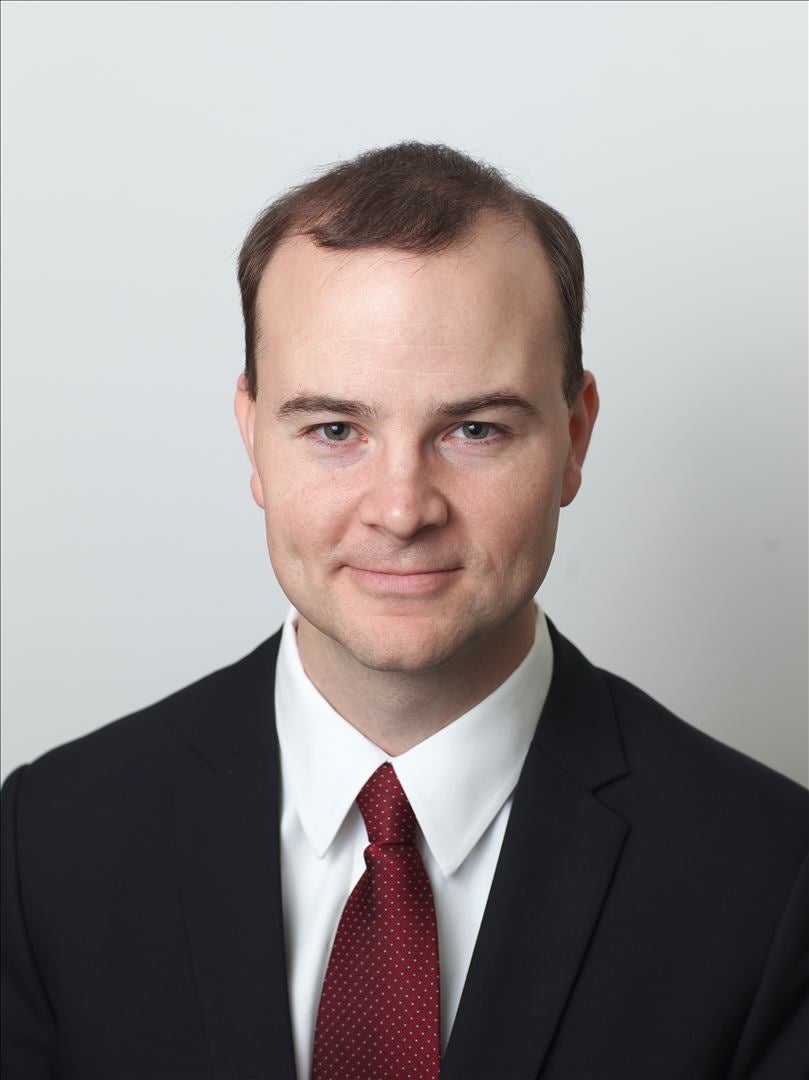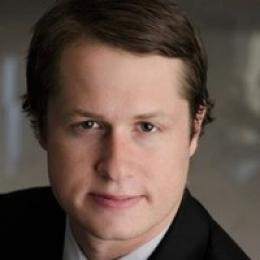
Matt Nolan
MANAGER OF GOVERNANCE AND COMPLIANCE,
GREATER CHINA DOW CORNING CORPORATION
Matt Nolan likes a good opportunity. He’ll rarely turn it down. That’s how he went from the 38,000-person town of Muskegon, Michigan, which is on the eastern shore of Lake Michigan, to the 24 million-person metropolis of Shanghai. Nolan is Dow Corning’s manager of governance and compliance for Greater China.
When Cornell Boggs became the silicon producer’s general counsel in 2012, he met with Nolan and other members of his legal team to see what their professional ambitions were. Nolan said he desired an executive leadership role long-term, and wanted to know what it took to get there. In essence, he was open to any opportunity that would help the company and allow him to learn and develop.
The following year, he was presented with an option to take a three-year assignment focusing on governance and compliance in China’s most populous city. After talking to his wife, who works in Dow Corning’s marketing department, they seized the chance.
The first step of the journey
Nolan’s worldview is crucial to understanding his ability to adapt to challenging scenarios: “In general, I think life is too short to avoid trying and doing things because of what might go wrong.”
He acknowledges that grocery shopping is difficult in Shanghai, and he has yet to find an affordable place to golf. But he is an optimist, and the opportunity to reassess and contextualize his American viewpoints is priceless. One realization he’s had is that the average person in China is much more aware of US history than the amount of Chinese history the average American citizen knows.
A lot of lawyers come to China and view it as a problem to be solved, which Nolan feels is the wrong approach. It is pivotal that lawyers partner with their Chinese counterparts and listen to their concerns, if they truly want to impact a company’s business and risk profile in a positive direction.
Learning to listen
Listening is something that Nolan has honed his whole life. He was the drum major of his high school’s state-championship-winning marching band, a role that requires communicating the band director’s priorities to the band, as well as translating the band’s concerns back to the band director in real time.
When it was time for college, he made the two-and-a-half hour drive to Ann Arbor to attend the University of Michigan. Going into college, his dad’s advice was to earn grades that would be good enough to keep his parents happy, but otherwise enjoy the best four years of his life. Nolan knew college wouldn’t be all academics; he flirted with joining the marching band but wanted a new experience, and decided to run for student government (and ultimately student body president).
As a political science and history major, it made sense. He wanted to hear and listen to the students, and translate those needs to the administration. Remembering what his father told him, he skipped classes for a month to campaign to the student body (although he says at the time, his dad didn’t necessarily interpret that advice in the same way!). “I learned more from organizing a group of 70 people campaigning to a populace of 40,000 on campus than I would have sitting in lectures about Russian politics that month,” he remembers. Listening to the priorities of the board of regents and campus administration, and positioning student concerns appropriately, helped him obtain adoption of a two-day fall break in the UOM calendar and other practical improvements for students on campus.
Nolan learned lessons he still uses today, like being able to roll with the punches.
“When you have things planned out for how you think you’re going to take care of them and then at the 11th hour you get a new variable, being able to roll with that, being able to manage it, all of those things are skills that I developed during my time in the student government and that I probably draw on today,” he says.
He continued his work in politics after student government. He took the LSAT but also worked on the Michigan governor’s race, organizing the campaign’s statewide student operations during the fall of his senior year. His candidate lost and law school loomed.
Nolan didn’t stray from Ann Arbor. He went to the law school across the street. At the time, he didn’t realize what he was getting himself into and didn’t quite know what an in-house lawyer was. “My idea of a big law firm was my Uncle Pat’s firm back in Muskegon that had seven or eight lawyers,” he says.
He gravitated toward business law and distinctly remembers his 1L contracts professor James J. White, a legend in legal circles who literally wrote the book on uniform commercial code. Nolan’s other favorite law class was constitutional law, and with a solid basis of business law, he got a job in Chicago with Kirkland & Ellis LLP.
A non-linear approach
At Kirkland & Ellis, Nolan specialized in mergers and acquisitions in the private equity group. “I was frustrated by the fact that every time I would get to know people in a company and start to get to understand the operations of a company, we’d be closing the transaction and moving on to the next one, so you never had time to invest in those relationships or look proactively to prevent future problems from coming up,” he says. He started to feel that an in-house career would be more suited to his tastes.
Dow Corning, based in Midland, Michigan, offered him a job as commercial counsel. It exposed him to the different types of businesses that use silicon, a polymer material used in over 7,000 products including sealants, adhesives, rubbers, lubricants, silicon oils, and solvents.
Nolan began by counseling the company’s polysilicon business, which sells “hyper pure” silicon for use in the semiconductor and the solar panel industries, and its silicon metal and natural resources operations, early stage manufacturing that enables other parts of the company’s business. Over time he’s also counseled the company’s electronics, lighting, and construction businesses, expanding his perspective across the company’s various challenges and objectives.
Dow Corning was formed in 1943 and Nolan enjoys recounting the founding of the company. Remember, he was a history major. The company’s first product was a silicone resin that allowed American-made planes to fly across the Atlantic without the engines gumming up, he says. When the war concluded, company leaders started looking for commercial applications.
At Dow Corning, Nolan has become involved in different projects over time. His government campaign experience, which he thought he would never use again, became an asset. The company asked him to counsel its political action committee and help guide their way through lobbying law. The Dow Corning Political Action Committee contributes funds to candidates on both sides of the aisle that share the values and goals of the company. Before moving to China, he also was able to tap into his leadership skills to support the PAC and the Dow Corning Foundation as a board member of each.
Another initiative he undertook was to lead the construction of the law department’s first Diversity and Inclusion Committee. Boggs encouraged him to find places where the legal department could be better. Nolan says that rather than trying to standardize and make everybody the same attorney, the D&I committee helps the department look for ways to bring each individual’s perspectives, expertise, and knowledge to their work. “To me, that’s where there’s just an incredible, incredible untapped potential in most legal departments and companies,” he says. “Finding ways to be more efficient with what you have, which means getting smarter at how you work — to me inclusion and diversity are very much aligned with and tied up in that.”
Nolan continues to look for ways to help the company, and improve himself. He is always listening and looking for opportunities. “When success was coming my way in high school, my Grandma Nolan told me that she was proud, but also asked if I felt I was trying my best — to her, that was the true measure of success, not however the external world rewards or judges you. The greater your ability, the greater your responsibility. I like finding opportunities to learn, to see what I’m made of and to continually make myself and organizations I am affiliated with better. I firmly believe in making other people aware of the fact that that is my approach to life in order to find more opportunities to do so — anything short of that just feels like a missed opportunity, given how short life is. Time is the only asset we’re not yet capable of creating more of, so we should be deliberate with how we spend those hours.”
Getting to know... Matt Nolan
What's your favorite food?
This is a different answer than what it would’ve been two years ago, when I had never heard of "辣子鸡" (la zi ji), which is spicy chicken, specifically Sichuan-style spicy chicken. It’s sort of like a fried spicy chicken, but much hotter than what I’m used to back home and not sauce based. It is my favorite food in the world now — I’m actually going out for it tonight.
What's your ideal vacation?
My ideal vacation is different in different moments in time and settings based on what I’m looking for. Unplugging is probably the commonality, because I really do try to truly unplug when I do vacations as much as possible. That’s challenging more and more. Sometimes that might be wandering around and learning about a European city with my wife, sometimes it’s just hitting the beach somewhere in Southeast Asia, and other times its going up north in Michigan to Mackinac Island or doing a nice golf weekend, but unplugging I think is the commonality. Anytime that I can actually do that, it’s a good vacation.
What's your opinion of University of Michigan coach Jim Harbaugh?
I didn’t expect this question, but am glad you asked! Jim Harbaugh is the perfect man in the perfect job at the perfect time. My friends and I, months before the Harbaugh situation unfolded at Michigan, sort of looked around at each other and said, “If it’s not Harbaugh, we’re not sure where the future of Michigan football is heading.” It would have been a travesty for all of football to never have him reunited with this program — it’s just too good.
As somebody who lived in Ann Arbor, as a kid, who played quarterback there, as the hot coach in football (pro or college) to be able to get him back to Michigan, putting that block “M” hat on, managing that team, getting that vibe back around it... even before we lined up for a game at the start of the year and regardless of what the outcome was going to be this season, you could tell that the character and energy of what Michigan football meant had already returned. To me, that has meant everything in the world. I give a very big thumbs up to Jim Harbaugh to this point.




